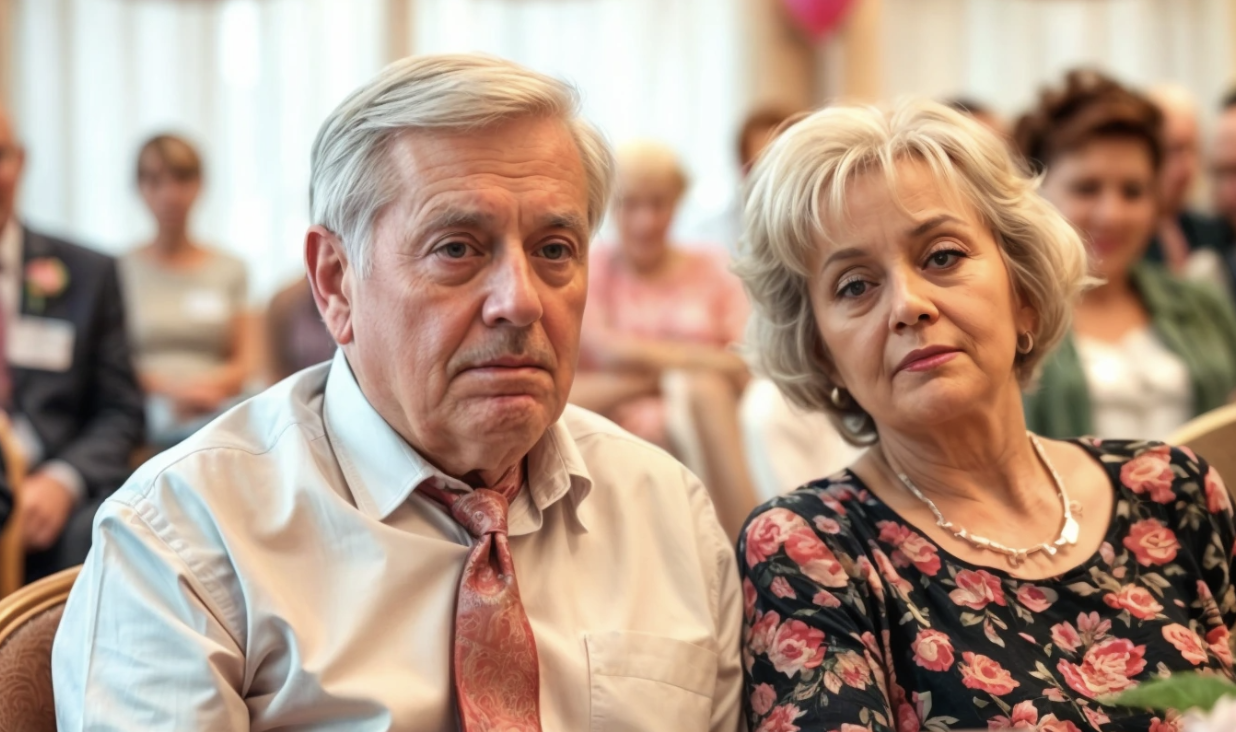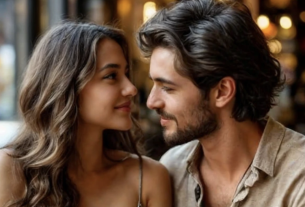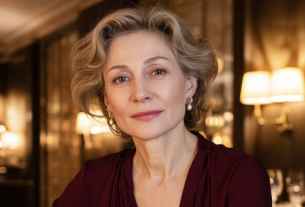Loud applause gradually died down, the glasses of champagne were half emptied, and the guests’ faces glowed with smiles. Fifty years of married life — a golden wedding anniversary. Around the long festive table gathered children, grandchildren, old family friends. They had all come to celebrate not just an anniversary, but a symbol of a strong family bond. At the center of the celebration were Mikhail and Valentina, the honored couple of the day. He wore a strict classic suit with a neatly tied golden tie; she wore an elegant cream dress, her hairstyle neat, smiling modestly.
“My dear ones!” — the eldest son raised his glass, his voice trembling with emotion. “You have become for us an example of true love and loyalty! Fifty years together — that’s rare! It’s a miracle!”
Toast after toast was made: memories of youth, funny stories from family life, warm words of gratitude, laughter and tears. Everyone asked Mikhail to speak. He slowly stood up, straightened his jacket, scanned the room with his gaze, then looked at his wife. A long silence fell, as if time itself froze.
“I want to tell the truth,” he said in a low, almost whispering voice. “These fifty years… I have not loved you.”
A dead silence hung in the room. Someone dropped a fork, the clang of metal echoed around the hall. Valentina went pale but stayed seated, not showing a single movement revealing her state. The guests exchanged glances, some even looked away, feeling awkward. The daughter-in-law wiped tears with a handkerchief; the grandchildren looked at the adults confused, not understanding what was happening.
“I have not loved you,” Mikhail repeated, not taking his eyes off his wife. “But the image you showed me on the very first day we met. That girl with the warm voice holding a volume of Akhmatova. The one who argued with me about Chekhov and laughed, with a candy clutched between her teeth. Since then, every day I saw that very her in you. Though years passed, though you changed — I have always loved that first you. And you know, you never betrayed her.”
Tears slowly ran down Valentina’s cheeks. She covered her face with her hands but did not sob — these were tears of relief, as if she had long awaited these words, wanted to hear them. The guests began to relax — now it was clear that the man was not talking about a breakup but about something much deeper. Someone smiled, someone sobbed, touched to the core.
Mikhail approached his wife, gently took her hand, like he did so many years ago when they had just started their journey.
“I did not love you — I loved everything real in you, and it was more than just love. It was — forever.”
The room burst into applause. Even the waiters, who were already ready to clear the tables, stood wiping tears secretly. The emotions were too strong to keep inside.
When the applause died down a little, Valentina still could not utter a word. Her lips trembled, her eyes were full of tears — not from resentment, not from pain, but from that strange, bittersweet feeling that arises when the heart suddenly remembers everything at once: the first meeting, the quarrels, peaceful evenings in the kitchen with tea, the birth of children, winter walks, illnesses, and joys.
She stood up, not letting go of Mikhail’s hand.
“And I…” she finally whispered, “all these years I was afraid you would stop loving that first me. That wrinkles, fatigue, illnesses would erase from your memory that girl with a candy in her mouth. But you kept her… Thank you.”
She turned to the guests, and confidence sounded in her voice:
“You know, I did not expect such words. He did not give compliments, did not give flowers without reason, forgot anniversaries… but once, when I had my gallbladder removed, he sat by my bed all night and whispered: ‘You will get better. I’m here.’ And I realized — that is love.”
The eldest grandson, a fifteen-year-old boy, suddenly jumped up from his seat:
“Grandpa, grandma! How did you even meet?”
Mikhail laughed, and that laugh sounded so light, as if he had become young again.
“She worked at the library. I came for a book, and left — with a life.”
The guests laughed again. The atmosphere became even warmer. The grandchildren began eagerly asking what grandma was like in her youth. Family friends recalled stories even the children didn’t know. It was as if the whole hall became a big family living room filled with memories and light.
Later, when almost everyone had left, Mikhail and Valentina sat on the veranda wrapped in blankets under twinkling garlands.
“What if you hadn’t come to the library then?” Valentina quietly asked.
Mikhail looked at the stars, was silent, then replied:
“I would still have found you. Because you are my only reality. No matter when and where.”
She smiled, leaned toward him and whispered:
“Then let’s meet in the next life at the library. In the same place.”
He nodded:
“And I will take ‘Anna Karenina’ again, to stay a little longer.”
But imagine a different version of this scene. Imagine that instead of tender words, Mikhail said something else entirely.
When Mikhail said:
“I have not loved you all these 50 years…”
—the room froze.
Valentina slowly lowered her glass. Her face showed nothing — no pain, no anger. Just cold, tired silence.
“I loved another woman,” he continued. “Since we were twenty… I met her before you. We planned to marry. But my parents insisted I choose a ‘practical’ one. And you… you were just that.”
Some guests began whispering among themselves. Some were already getting up from the table — awkward, frightened. Someone grabbed their phone to record what was happening. Some just sat stunned.
“Mikhail,” the eldest son intervened, “why are you saying this now?”
But the father just shook his head tiredly.
“Because I’m tired of living a lie. I lived my whole life with a woman I respected but did not love. And at the sunset of life, I want to say — I was wrong.”
Valentina did not scream. Did not cry. She simply stood up from the table, slowly approached him, and said:
“Thank you. For your honesty. Even if belated.”
She took off her wedding ring, carefully placed it next to the glass.
“And now you can be free. Late, but — free.”
Later.
The guests had left. The hall was empty. Only traces of the celebration remained — crumpled napkins, leftover food, overturned chairs.
Valentina sat on the balcony, wrapped in a blanket, with a cup of cooled tea in her hands.
Her granddaughter approached.
“Grandma, did you… did you love him?”
“Me?” Valentina smiled faintly. “Yes. At first — yes. Then — I got used to it. And then — we just lived. Like two people who lost the ability to speak heart to heart.”
“And what now?”
“And now…” she looked at the dawn, “I will live a little time for myself. Without illusions. Without masks. And maybe, for the first time — freely.”
Final scene
A few months later, on an early autumn morning, at the dacha where the whole family once gathered for barbecues, Valentina meets a neighbor — a widower, lonely and quiet, but with kind, attentive eyes. He hands her a jar of jam:
“Try it. Currant.”
“Thank you,” she smiles. “You know, Mikhail never liked currants. But I loved it.”
“Then we already have something in common,” he quietly laughs.
And in those eyes, for the first time in many years, Valentina felt… not just interest, but a promise. Small, but real. A promise of a new life. A life that will belong only to her.



